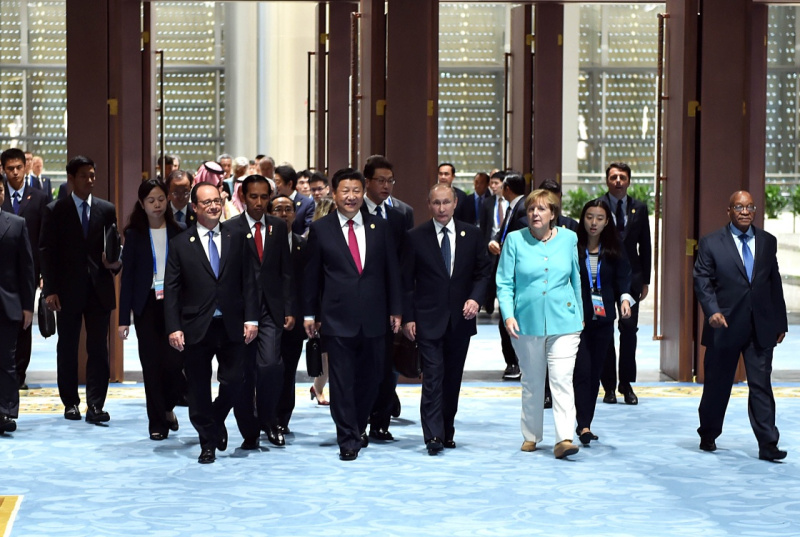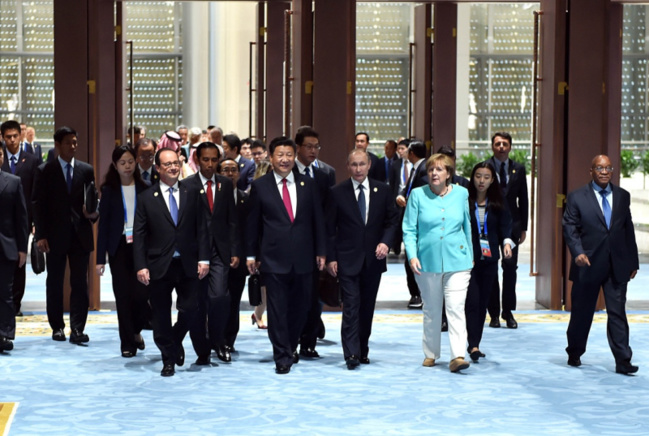By Zheng Yongnian - People’s Daily
The international community is in a time of constant geopolitical change. Unfortunately, we have yet to shake off the shadow of the 2008 financial crisis that shook the world's economic structure. Though all countries tried to make adjustments after the crisis, the situation remains the same today for the US, Japan, the EU and other major economies.
The latest round of globalization started in Western countries in 1980s. However, while bringing earth-shaking changes to the world economic landscape, it also caused serious challenges to the world economy and domestic economies of various countries.
As state-to-state policy coordination lagged behind globalization, two crises have occurred, the 1997 Asian Financial Crisis and the 2008 financial crisis, which in turn propelled the establishment of the G20.
As all countries focus on their domestic political agendas, interest in international economic cooperation has lost its momentum. As a matter of fact, today’s global conundrums can all be attributed to economic security - Brexit, rising populism in the US and the chaos in the Middle East are all, in essence, economic issues.
Economic security is a basic requirement for human society and the foundation for security at other levels. However, the world is pursuing other levels of security when economic security is clearly missing. The G20 intends to reverse this trend and avoid geopolitical traps. In terms of promoting international economic cooperation and remodeling global economic governance, the G20 can play a significant role.
One role of the G20, which covers major global economies, is coordinating world economic growth. Leaders of major economies will reach consensuses and restore confidence at the G20 Hangzhou Summit, which is a prerequisite to improve global financial governance.
I hope the G20 Hangzhou Summit can shift the focus from geopolitics to world economic cooperation. G20 members should diagnose why the world is still haunted by the financial crisis and why the economic structure is still uneven before finding solutions.
As the largest emerging market and developing country, China can help coordinate between developed countries and developing countries while offering its own perspective to current economic dilemmas, a role that embodies China’s active participation in global governance.
Through the G20 Hangzhou Summit, China hopes to showcase its responsibility as a major country and bring new impetus to the world economy. In the meantime, the China-initiated Asian Infrastructure Investment Bank and the “Belt and Road” initiative will also boost world economic growth. As a major trade country, China is also pushing forward global trade liberalization and facilitation.
Although the Chinese economy has entered the “new normal,” its economic growth rate still surpasses many other economies. The large base of the Chinese economy is an important engine for the world economy.
China boasts the fastest rate of restructuring among imbalanced world economies and the economic slowdown has not triggered large-scale unemployment in the country. Instead, private consumption is increasing, employment structures re improving and the economy is transforming into a consumption-dominated one, which will also make enormous contributions to other economies.
China is a part of the world economy. The stable development of the world economy will also promote the sustainable development of China’s economy.
(The author is the Director of the East Asian Institute of National University of Singapore.)
The latest round of globalization started in Western countries in 1980s. However, while bringing earth-shaking changes to the world economic landscape, it also caused serious challenges to the world economy and domestic economies of various countries.
As state-to-state policy coordination lagged behind globalization, two crises have occurred, the 1997 Asian Financial Crisis and the 2008 financial crisis, which in turn propelled the establishment of the G20.
As all countries focus on their domestic political agendas, interest in international economic cooperation has lost its momentum. As a matter of fact, today’s global conundrums can all be attributed to economic security - Brexit, rising populism in the US and the chaos in the Middle East are all, in essence, economic issues.
Economic security is a basic requirement for human society and the foundation for security at other levels. However, the world is pursuing other levels of security when economic security is clearly missing. The G20 intends to reverse this trend and avoid geopolitical traps. In terms of promoting international economic cooperation and remodeling global economic governance, the G20 can play a significant role.
One role of the G20, which covers major global economies, is coordinating world economic growth. Leaders of major economies will reach consensuses and restore confidence at the G20 Hangzhou Summit, which is a prerequisite to improve global financial governance.
I hope the G20 Hangzhou Summit can shift the focus from geopolitics to world economic cooperation. G20 members should diagnose why the world is still haunted by the financial crisis and why the economic structure is still uneven before finding solutions.
As the largest emerging market and developing country, China can help coordinate between developed countries and developing countries while offering its own perspective to current economic dilemmas, a role that embodies China’s active participation in global governance.
Through the G20 Hangzhou Summit, China hopes to showcase its responsibility as a major country and bring new impetus to the world economy. In the meantime, the China-initiated Asian Infrastructure Investment Bank and the “Belt and Road” initiative will also boost world economic growth. As a major trade country, China is also pushing forward global trade liberalization and facilitation.
Although the Chinese economy has entered the “new normal,” its economic growth rate still surpasses many other economies. The large base of the Chinese economy is an important engine for the world economy.
China boasts the fastest rate of restructuring among imbalanced world economies and the economic slowdown has not triggered large-scale unemployment in the country. Instead, private consumption is increasing, employment structures re improving and the economy is transforming into a consumption-dominated one, which will also make enormous contributions to other economies.
China is a part of the world economy. The stable development of the world economy will also promote the sustainable development of China’s economy.
(The author is the Director of the East Asian Institute of National University of Singapore.)
 Menu
Menu
 Economic security should be highlighted in G20 Summit: commentary
Economic security should be highlighted in G20 Summit: commentary

















